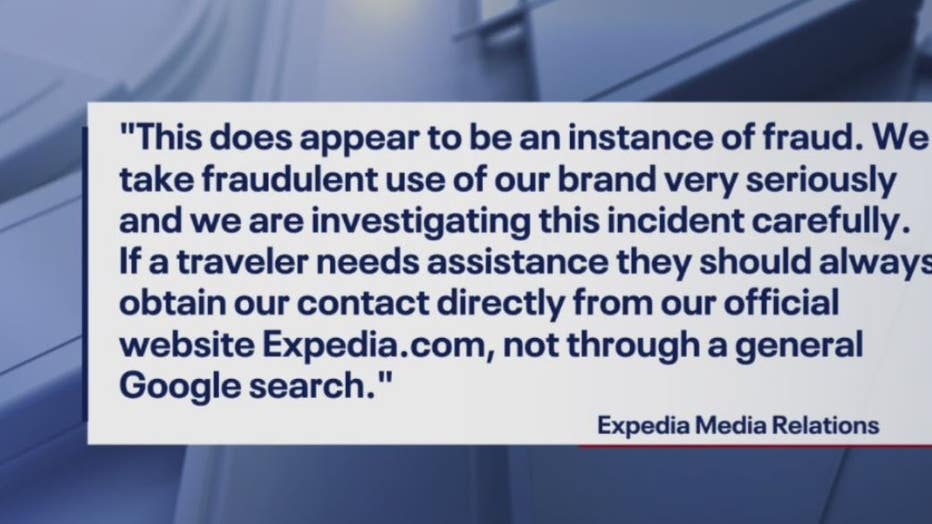Expedia imposter's Google listing scams FOX 2's Derek Kevra; expert says what to look for

Fake Google listing for Expedia leads to online scam for FOX 2's Derek Kevra
A meteorologist by trade, Derek makes a living out of predicting the future of sorts - but he didn't see this one coming.
FOX 2 - Online travel scams can happen to anyone, even FOX 2 Meteorologist Derek Kevra. When he attempted to cancel his family's vacation plans, it turned out he inadvertently put himself in contact with the criminals.
Derek and his wife had booked a Mackinac Island vacation. But life happened, and they decided it wasn't going to be the best time - so they canceled their trip - or at least they thought they did.
In reality, they simply gave important financial information over to what they now believe are scammers.
A meteorologist by trade, Derek makes a living out of predicting the future of sorts - but he didn't see this one coming.
"I'm the tech guy at FOX 2, you just kind of feel like this isn't going to happen to me," he said.
But it happens all the time to virtually anyone and everyone - and for Derek it took place when he tried to cancel a summer trip.
"We took a look at our schedules and we just realized we're too busy, this isn't going to work," he said.
Their first call was directly to the hotel.
"(They said) 'You booked it through Expedia, so we can't actually see your reservation, you are going to have to cancel it through Expedia,'" Kevra said.
Okay, no problem, right?
"My wife googles the Expedia cancelation number, a number pops up, (she) calls the number, and it was a very normal conversation," Derek said.

He later learned they weren't talking to Expedia. According to cybersecurity expert David Derigiotis they were most likely speaking with someone trying to take advantage of convenience.
"Scammers and criminals try to hack their way to the top of search results - a lot of eyeballs always go to that first page," Derigiotis said.
In this instance, Derek was told he would get a full refund minus a small cancelation fee. He even got a confirmation email from who he thought was an Expedia representative.
"It looks as legit as it could possibly look, there's a picture of the property," he said.
Two days before the trip, the Kevras double-checked to make sure everything was taken care of.
"(My wife) goes on Expedia and the trip has not been canceled," Derek said.
This time, they entered an online chat directly on Expedia's website.
"That rep confirmed that the trip was not canceled, and whatever service that we had used to cancel the trip was a scam," he said.
Derigiotis said the person behind the scam was using the guise of several travel sites.
"The website was not Expedia, and I dug in a little bit deeper and saw that the individual person who created this website has also 30 other websites that are tied into things like Travel and Expedia," Derigiotis said. "He is hitching his wagon to a big and reputable name like Expedia."

The website Derek inadvertently used was Speedtrip.US, found in the small print at the bottom of his email. So, we gave them a call.
Derek: "Hi Manpree with Speedtrip.US?
"Okay."
Derek: "Is that correct?"
"Yes."
After some questioning, the person on the phone reversed course, saying they didn't know about Speedtrip.US - or any of the other websites allegedly licensed to him.
Derek: "We booked a trip through Expedia and we were charged money to cancel it, and that never happened. So I was curious if you could explain to me what was going on with that?"
"Like I said, I don't even know which company," the voice said. "If you have something that you can show me, because I am the owner."
Derigiotis: "What about Expedia-Booking.US that is also registered under your name, along with 30 other websites."
"No, that's not even my ..."
FOX 2 reached out directly to Expedia. In a statement they wrote:
"This does appear to be an instance of fraud. We take fraudulent use of our brand very seriously and are investigating this incident carefully. if a traveler needs assistance they should always obtain our contact direct from our official website Expedia.com not through a general Google search."
"We fell right into it," Derek said.
"Exactly, they are hoping you are going to search for those things," Derigiotis said. "That is what they want, the trapdoor that they are opening and want people to walk right into."
"And it didn't help that we were in a hurry," Derek said.
Most scammers are counting on impulsive decision-making. They also count on you not reporting it to anyone - either because you caught it in time.
"You kind of go, okay, we solved the problem, let's just move on," Derek said.
Or, because you don't think it will make any difference:
"You feel like a fool that you got taken advantage of and you feel helpless," Derek said.

Derigiotis agrees.
"Right, you are one person. But that's the name of the game one person here, one person there," he said. "It's a game of whack-a-mole, it takes time and effort and there is a little shame - but you shouldn't feel shame.
"It's very prevalent and we have to do everything we can, to make sure the next person doesn't fall victim."
Thankfully Derek and his wife were still able to go on that trip, once they learned it was never canceled.
As for who you should reach out to, there are resources with both the FTC and FBI Internet Crime reporting site. While it's hard to recoup your money, it could stop the next person from falling victim to the same scam.
Resources:


